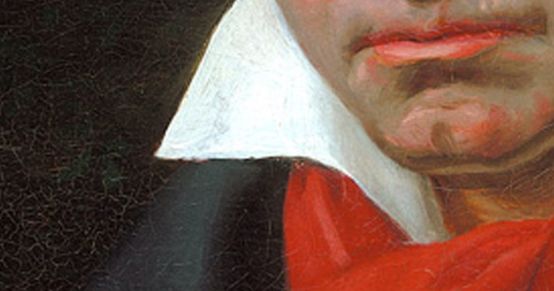Choral fantasy
Every Friday, Beethoven is here. To mark the 250th anniversary of Beethoven's birth, each week the Swiss Music Review takes a look at a different work from his catalog. Today, it's the Fantasy for piano, chorus and orchestra in C minor.

Finale. The word appears curiously after only 26 bars of piano improvisation in the allegro of the Fantaisie op. 80. Moreover, the orchestra must enter here only at the pianist's signal (Qui si dà un segno all' orchestra o al direttore di musica). An astonishing 586 bars follow. In a march-like rhythm, strings enter as if from afar, approaching in crescendo, horns and oboes exchange brief calling motives with an echoing effect, before introducing a piano melody that Beethoven borrowed from himself - from the song Gegenliebe (WoO 118) written as long ago as 1794/95. It becomes the theme of the variations that follow, in which the various wind instruments are introduced one by one, as in chamber music: flute, oboes, clarinets with bassoon, then the string section leaders in quartet, finally the tutti, before the soloists and chorus.
This particular work, which still garners divergent opinions from time to time, was the last piece on the program of Beethoven's great Academy at the Theater an der Wien on December 22, 1808. It was the crowning achievement of a long evening that also included the 5th and 6th Symphonies, parts of the Mass in C major, the aria Ah perfidothe 4th Piano Concerto and an unnamed piano fantasia. Beethoven's idea of all the musicians coming together is evident in the program note, on which the work is announced as a "piano fantasia, which gradually develops with the entrance of the orchestra, and finally ends with the arrival of the choirs as a finale [!]". Johann Friedrich Reichardt spent the evening in the box of Prince Lobkowitz, who had invited him, and recorded his impressions in his Intimate letters written during a trip to Vienna (1810). He, too, was surprised by this work, whose performance had to be interrupted and resumed after a failed entrance. The underlying idea of recalling the evening by bringing all the musicians together was thus lost sight of: "Eleventh piece: a long fantasy, in which Beethoven showed all his mastery, and finally, in conclusion, another fantasy, to which the orchestra joined and finally even the choir. This strange idea failed in its execution due to such total confusion in the orchestra that Beethoven, in his holy artistic zeal, called to stop and start again from the beginning, without a thought for the audience or the performance venue. You can imagine how much I suffered with all his friends over this.
But this hastily written composition had not only been insufficiently rehearsed. The entire concert, lasting a total of four hours, had exhausted both musicians and listeners, as Reichardt reports: "We endured the bitterest cold from half past six to half past ten, and found from experience that the best is the enemy of the good". In the end, the text that ends the choral fantasia with brilliance and emphasis in C major probably went unnoticed: "So accept with joy, beautiful souls / The gifts of art / When love and energy come together / Humanity receives the favor of the gods".
Aufnahme auf idagio








